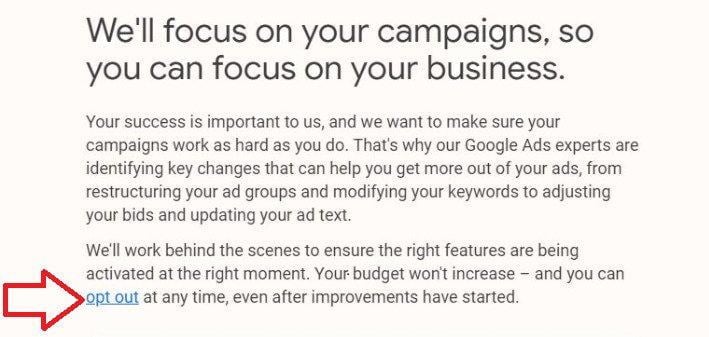
Late last week, Google Ads emailed a group of advertisers to notify them that their accounts will be taken over by “experts” unless they opt-out of the free service within seven business days.
Aaron Levy (@bigalittlea) of Elite SEM broke the story via Twitter early Thursday morning, and it was quickly picked up by Search Engine Journal. Here’s what that email looked like:
According to the email these Google Ads users received, failure to opt-out will enable Google’s in-house account managers to restructure your ad groups, modify your keywords, adjust your bids, update your ad copy, and more. (They do assure recipients that their budgets won’t increase.) A spokesperson from Google has said that these emails are part of a new pilot program.
According to WordStream’s Mark Irvine, another Google representative has confirmed that the email was sent only to Google Ads users whose accounts aren’t linked to MCCs—meaning those that aren’t currently managed by an agency.
If you got one of these emails, you might be unsure as to what it means and how to proceed. Basically, unless you take action, Google may become the PPC agency you didn’t ask for.
What This Means for You
Google has put the ball in your court. As of now, allowing their team to have access to your Google Ads account is the default option. If you don’t want other people making changes to your campaigns, ad groups, keywords, and ads, you have to explicitly let Google know.
Our take? You should opt out of Google’s in-house management service.
It’s not that Google’s account managers don’t know the ins and outs of PPC. They do. But, at the end of the day, nobody knows your business like you do. And this service would likely rely heavily on automation. Automation can only go so far, and it doesn’t work in every use case.
Recently, Google broadened exact match keywords to match with semi-close variants such as synonyms and paraphrases. This essentially amounted to changing your keyword match types. For one advertiser who targets the exact match keyword [leather handbags], Google began serving their ads to users who searched “cheap purse.” Those … aren’t the same thing.
Dynamic ad extensions enable Google to automatically add extensions like sitelinks to your text ads. Considering sitelinks provide the opportunity to direct prospects to conversion-focused landing pages that depend on context, relinquishing control over them is seldom a good idea.
Those who leverage automated bid strategies allow Google to algorithmically determine how their spend is allocated across their ad groups and campaigns. Take the strategy known as Maximize Conversions, for example. Basically, you set a daily budget for the campaign you’re automating and tell Google to allocate it such that you drive as many conversions as possible. Unsurprisingly, as long as this automated strategy is in place, Google will spend every cent within your daily campaign budget—regardless of how well the campaign is performing.
Although automation can save you lots of time and, in aggregate, is usually worthwhile, there are always exceptions to the rule, which is why it’s important to maintain manual control of your account.
Here’s the bottom line: Successful management of a PPC account requires a genuine, comprehensive understanding of what the business does, the industry in which it operates, and the customer base the business serves.
What Comes Next?
If you don’t opt out, you may start seeing changes in your Google Ads account as early as next week.
If you do want to opt out, go back to the email from Google Ads. At the end of the second paragraph, you’ll see the words “opt out” with a hyperlink. Click through and follow Google’s instructions from there.
In the meantime, do what’s best for your business!
P.S. If you’re crunched for time and need help managing your Google Ads account efficiently without handing the reins to Google, here are a few resources:









